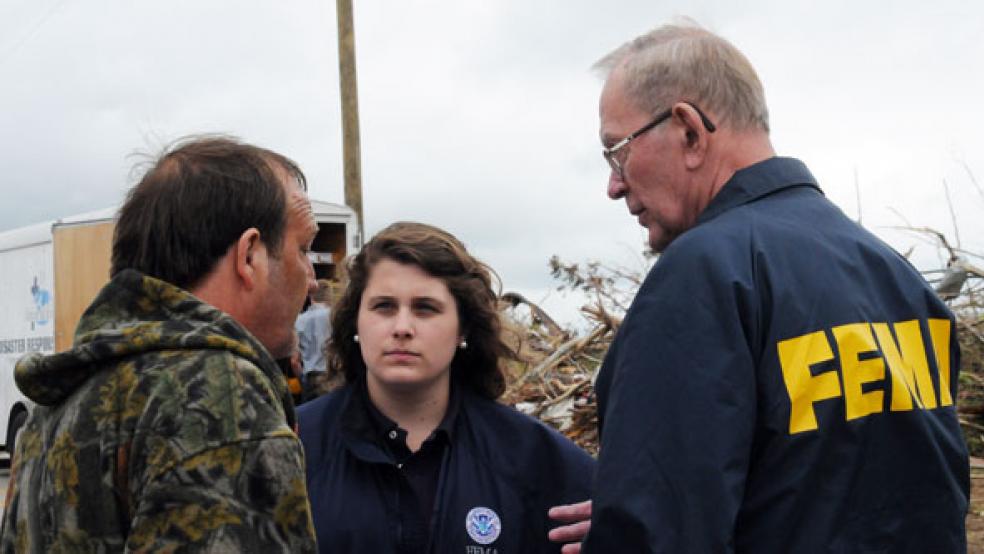Mitt Romney’s comments in the early stages of the presidential campaign about the Federal Emergency Management Agency came back to haunt him Monday, as Hurricane Sandy made landfall with a vicious power.
At a June, 2011 GOP primary debate, the former Massachusetts governor endorsed shifting the responsibilities of FEMA to state governments and private companies.
“Every time you have an occasion to take something from the federal government and send it back to the states, that’s the right direction,” Romney said in response to a question about the agency. “And if you can go even further, and send it back to the private sector, that's even better.”
The Romney campaign has since explained away the comments in statements to media outlets as an argument for states to take the lead on disaster relief. But the former Massachusetts governor went a step further during the debate and argued that expenditures by FEMA—which not only provides aid but helps rebuild local economies after a natural disaster—contributes to the national debt.
“Instead of thinking, in the federal budget, ‘What we should cut,’ we should ask the opposite question, ‘What should we keep?'” Romney said. “We should take all of what we're doing at the federal level and say, what are the things we're doing that we don't have to do? And those things we've got to stop doing, because we're borrowing $1.6 trillion more this year than we're taking in.”
FEMA acquired a terrible reputation during the Hurricane Katrina fiasco in 2005, when 1,833 people died after the storm tore apart and flooded much of New Orleans and the coast along the Gulf of Mexico.
Within four days of the hurricane, President George W. Bush signed a $10.5 billion relief package, but the slow and disorganized response—often broadcast live on television—made FEMA the symbol of a dawdling and wasteful government bureaucracy. "FEMA has been here there days yet there is no command and control,” said Terry Ebbert, who was the director of homeland security for New Orleans during the hurricane. “We can send massive amounts of aid to tsunami victims but we can't bail out the city of New Orleans.”
The political appointee running the agency, Michael Brown, quickly became the fall guy and the agency began to turnaround in its response to the emergencies that have followed.
The FEMA Disaster Relief Fund spent almost $13 billion last year, leading to concerns that it could run dry. There were 99 major disaster declarations in 2011, compared to 81 in 2010 and 34 so far this year. As of August, a FEMA official told The Christian Science Monitor that the fund contained $1.5 billion.
However, the conservative Heritage Foundation concluded that the increase in major disaster declarations under Obama and President George W. Bush has little to do with Mother Nature. FEMA has become a “political pork-barrel spending agency,” Matt Mayer, a visiting fellow at Heritage wrote last January.
House Republicans also took a firm stand last year against more funding for FEMA, if it required additional debt by the government. After a tornado struck Joplin, Missouri, an earthquake shook the mid-Atlantic, and Hurricane Irene inflicted $19 billion worth of damage on the east coast, the agency was running dangerously low on money.
“Those monies are not unlimited. And what we’ve always said is we’d offset that which has already been funded,” House Majority Leader Eric Cantor, R-Va., told Fox News on Aug. 29. “Just like any family would operate when it’s struck with disaster, it finds the money it needs to, to take care of a sick loved one or what have you and then goes without trying to buy new car or put an addition onto the house.”
Lawmakers reached a compromise in Sept. 2011 that provided less money for FEMA than advocated by Democrats without the spending cuts being pushed by Republicans.
The haggling drew criticism from prominent Republicans including New Jersey Gov. Chris Christie, after his state was struck by Hurricane Irene.
“You’re going to turn it into a fiasco like that debt-limit thing, where you’re fighting with each other for eight or nine weeks. And you expect the citizens of my state to wait?” Christie said at the time. “They’re not going to wait. And I’m going to fight to make sure that they don’t.”
President Obama called Christie on Monday as flooding from Hurricane Sandy swallowed Atlantic City. This time, Christie complimented FEMA for its excellent performance.
Romney announced, according to the Associated Press, that he may go to New Jersey later this week to tour the wreckage caused by the storm.




